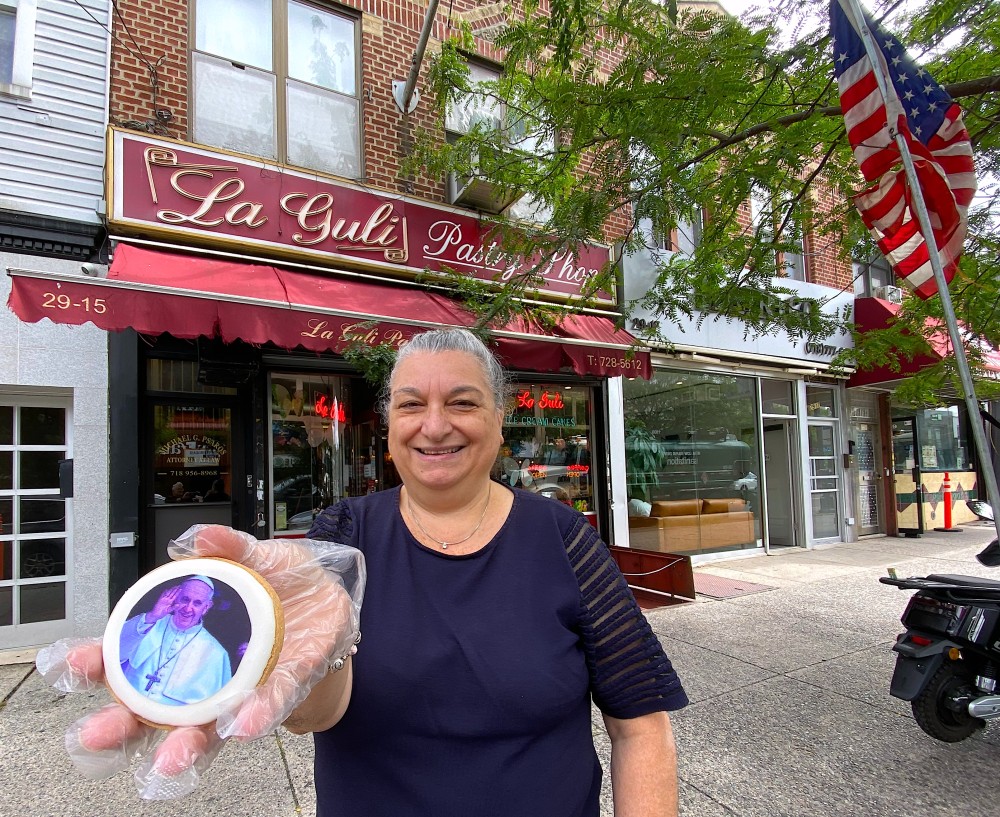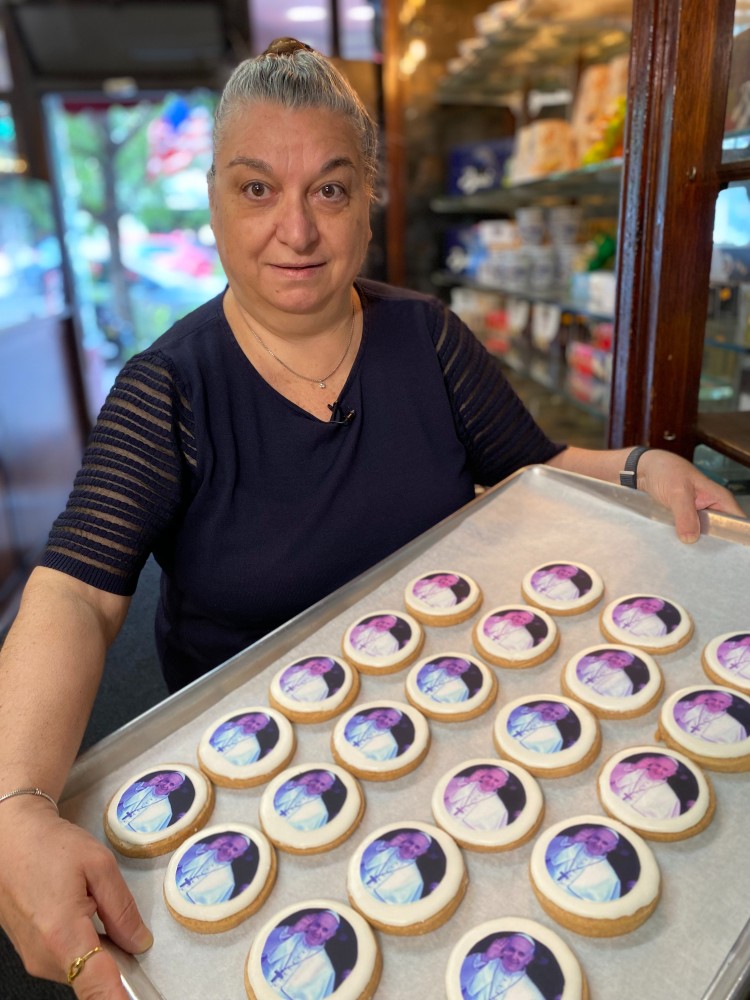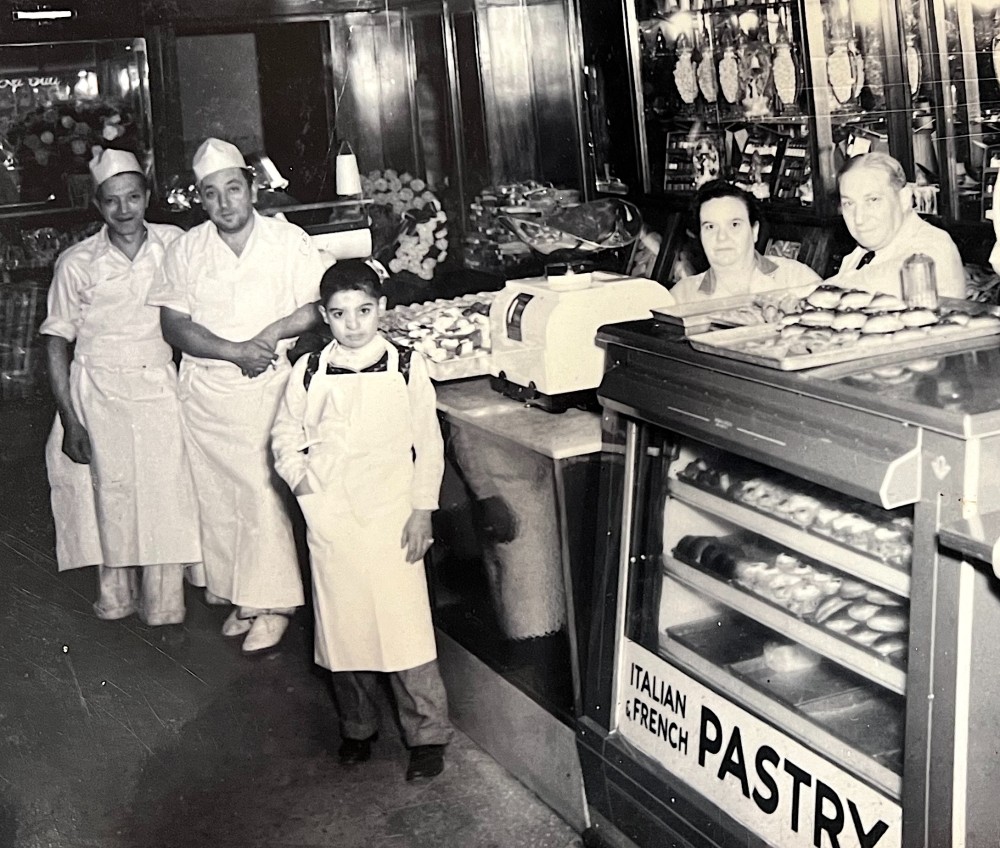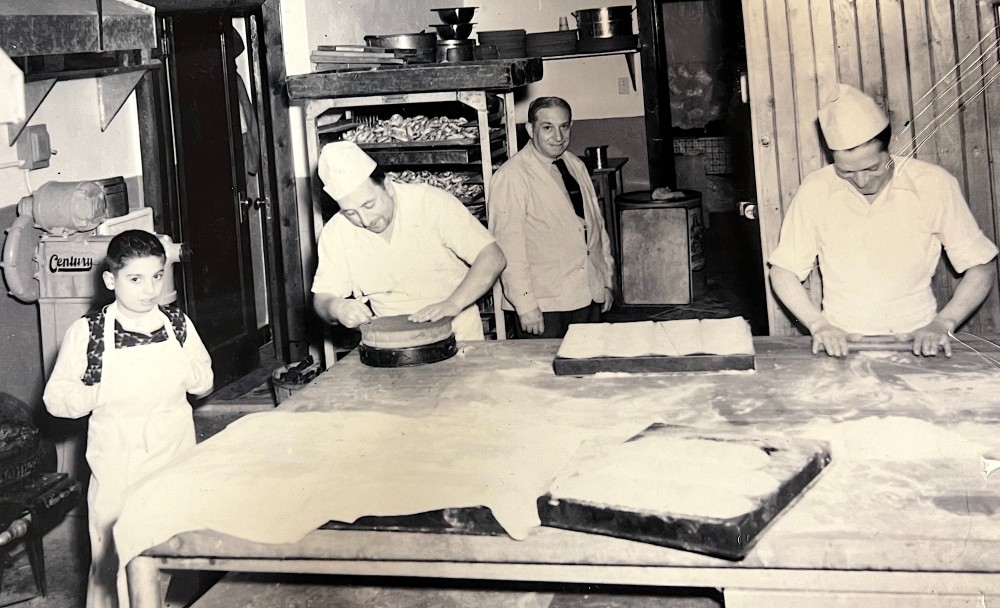
ASTORIA — Heavy security gates slammed loudly after Maria Notaro entered Rikers Island, New York City’s largest jail complex.
Guards scanned her from head to toe and thoroughly inspected her possessions — 100 cookies decorated with a photo likeness of Pope Francis.
Notaro wasn’t smuggling anything into Rikers. She came to celebrate a Mass for the feast of the Assumption of Mary with some of the incarcerated men. Still, the security measures, especially the slamming gates, startled her.
“It was very emotional, very scary,” she said. “I’m surprised I didn’t have nightmares.”
Notaro operates La Guli Pastry Shop, her family’s legacy business, on Ditmars Boulevard in Astoria. At Rikers, she accompanied Father Zachariah Presutti and the organization he founded, the New York City-based Thrive for Life Prison Project.
Her anxiety melted at the Mass. Later, she shared the cookies — replicas of the ones La Guli created to commemorate the Pope’s 2015 visit to The City.
The several dozen men at the Rikers Mass were overwhelmed. Some said the cookies were too beautiful to eat; others declared they couldn’t bring themselves to bite into the pope’s likeness.
“They were very sweet and very thankful,” Notaro said of the inmates. “Some of them were young, some not so young. Some just can’t make bail, and that’s why they’re still there.”
Many of her La Guli customers are employees from Rikers, located about three miles away, who stop in for coffee and pastries.

Another longtime customer recalled the commemorative pope-visit cookies from 2015 and suggested they might be well received by incarcerated men after a Mass celebrated at Rikers.
Notaro had a similar idea after seeing news reports in May of Pope Francis visiting Montorio Prison in Verona, Italy. The images of him visiting and eating with prisoners moved her.
“I thought, ‘That’s really nice because it’s trying to rehabilitate these people,’ ” she said. “Not everybody’s a hardened criminal.”
Notaro’s paternal grandfather, Paulo, immigrated to the U.S. in 1920 from Palermo, Sicily, where he worked in a bakery with his two older brothers.
In New York, Paulo labored in a luggage factory until he saved enough money to start his own pasticceria. He handled the business end while his brothers did the baking.
La Guli had three locations — two in Manhattan and one in Astoria, which now is the family’s only remaining storefront.
It has held the same spot on Ditmars Boulevard since 1937, just a few doors down from Immaculate Conception Parish, where Notaro is a proud member.

The pastry shop’s management continued with Notaro’s retired father, Rosario, who passed it on to her. The terrazzo floor, interior woodwork, and storefront facade are original.
For eight decades, the shop has received multi-star reviews for its cannoli recipes, special-occasion cakes, biscotti, layer cookies, and holiday items like Easter bread and marzipan lamb cake.
Notaro said La Guli’s zeppole pastries are so popular her bakers start production in November, months before the traditional partaking on March 19 — St. Joseph’s Day.
The first batch of “pope” cookies in 2015 was baked as “kind of a joke,” he said.
But, after seeing the pope minister to prisoners in May, she resolved to revive the recipe for people incarcerated in New York.
Father Presutti, a Jesuit, is also a chaplain at Rikers. He recalled how he got the call recommending a visit with cookies and eagerly arranged it for the feast of the Assumption.
“We celebrated the Mass together with over 60 inmates,” Father Presutti said. “And then afterward, they received a little bit of sweetness with these beautiful cookies.”
Father Presutti started Thrive for Life in 2016 to provide comprehensive spiritual and educational support for people released from incarceration.

This project operates three “Houses of Study” — Abraham House in the Bronx, Ignacio House in East Harlem, and Milwaukee House in Wisconsin.
Father Presutti said he led the men in extending hands toward Notaro and praying blessings upon her and the pastry shop.
“It’s a certain reciprocal nature,” he explained. “Baking for someone is very human, isn’t it? So, this was a very dignified celebration, and even more dignified was that we were able to celebrate the Eucharist.”
Notaro said she posted on social media that the commemorative pope cookies were back, and customers’ response has been enthusiastic. She’ll have the bakers make more if there is demand.
Father Presutti noted, however, that her gesture is an example of Catholic care for those behind bars.
“They know they’re not in their cells alone,” he said. “There’s a community on the outside that supports them, that’s praying for them.
“I think that’s evangelical in and of itself, because that’s what the Church is — a witness that a community cannot be snuffed out by prison walls, a witness to the Resurrection.”
